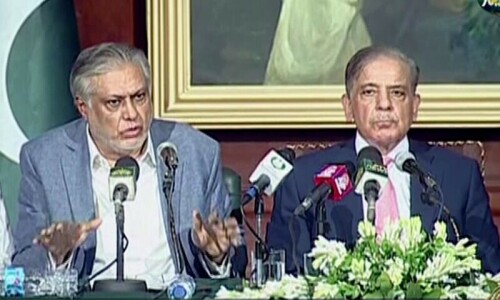The stock market witnessed the highest single-day gain on Monday with the benchmark KSE-100 index rising more than 2,400 points following the agreement with the International Monetary Fund (IMF).
The index was up 2,414 points at 43,867 at 11:30 am. It closed at 43,899 points, up 2,446.32 points from Friday’s close of 41,452.68.
“Historic day-on-day gain witnessed at PSX today with KSE-100 increasing by 2,446 points and closing at a 14 month-high,” said Arif Habib Ltd.
“On a DoD basis, it displayed the best performance ever. In the last three trading sessions KSE-100 has increased by 3,834 points (+9.57%),” it said.
Among the key stocks to advance, automakers rose 6-7.5 per cent on expectations that import restrictions would be lifted under the IMF deal.
Several automakers including Pakistan Suzuki Motor Co had announced prolonged plant closures in 2023, citing import restrictions.
Honda Atlas Cars (Pakistan) and Pakistan Suzuki shares rose 7.5pc to hit upper circuits while Indus Motor Company, which markets Toyota cars in the country, gained 6pc.
Salman Naqvi, the head of research at Aba Ali Habib Securities, attributed the surge to the staff-level agreement with the Fund for a $3 billion stand-by arrangement.
“This is a very good agreement,” he said, expressing the hope that it would also help the local currency to recover. He said that agreement would also pave the way for the release of funds from multilateral and bilateral donors.
He said that the country’s economy had been granted “breathing space”, the effects of which were being witnessed on the stock market.
Ali Malik, CEO of First National Equity, also attributed the rally to the IMF agreement.
“Investors were previously nervous and fearful of doubts that the country might default or could go through very tough economic times. Now they can see a direction of stability going forward,” he said.
Pakistan had secured a badly-needed $3bn short-term financial package from the IMF on Friday, giving the economy a much-awaited respite as it teeters on the brink of default.
The deal — subject to approval by the IMF board in July — came after an eight-month delay and offers some respite to Pakistan, which is battling an acute balance of payments crisis and falling foreign exchange reserves.
The $3bn funding, spread over nine months, was higher than expected as Islamabad was awaiting the release of the remaining $2.5bn from a $6.5bn bailout package agreed in 2019, which expired last week.
Meanwhile, Prime Minister Shehbaz Sharif congratulated the nation and the business community on the rally in the stock market. In a statement, he said that because of the government’s “hard work and sound policies”, there were signs of economic recovery.
He said that the country had “once again” turned towards the path of development, adding that investor confidence had been restored after the standby agreement with the IMF.
PM Shehbaz also vowed to rid the masses of inflation and promised employment for the youth.
Additional input from Tahir Sherani















































Dear visitor, the comments section is undergoing an overhaul and will return soon.